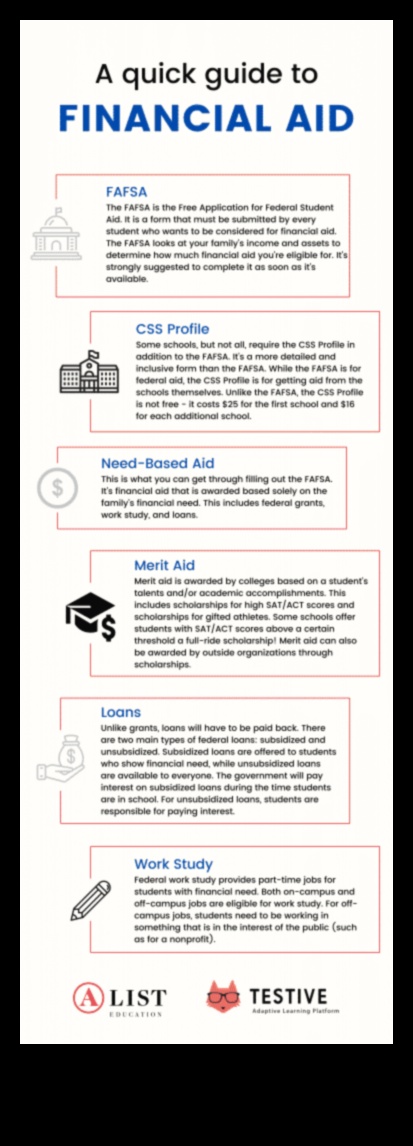
What is a college grant?
A college grant is a type of financial aid that does not have to be repaid. Grants are awarded based on financial need and/or academic merit, and they can help students cover the cost of tuition, fees, books, and living expenses.
How do I apply for a college grant?
The application process for college grants varies depending on the specific grant you are applying for. However, in general, you will need to submit the following documents:
- Your FAFSA form
- Your high school transcript
- Your SAT or ACT scores
- A personal statement
- A letter of recommendation from your guidance counselor or teacher
What are the different types of college grants?
There are many different types of college grants, each with its own set of eligibility criteria. Some of the most common types of grants include:
- Federal Pell Grants
- State grants
- Private scholarships
- Need-based grants
- Merit-based grants
How much money can I get in college grants?
The amount of money you can receive in college grants depends on the specific grant you are applying for. However, in general, grants can range from a few hundred dollars to several thousand dollars.
What are the requirements for getting a college grant?
The requirements for getting a college grant vary depending on the specific grant you are applying for. However, in general, you will need to meet the following criteria:
- Be a U.S. citizen or permanent resident
- Be enrolled in a degree-seeking program at an accredited college or university
- Demonstrate financial need
- Have a good academic record
What are the benefits of getting a college grant?
There are many benefits to getting a college grant, including:
- Free money to help pay for college
- No need to repay the money
- Can help you reduce your student loan debt
- Can improve your financial aid package
How do I find college grants?
There are many ways to find college grants, including:
- Your college or university’s financial aid office
- The FAFSA website
- College scholarship search websites
- Your high school guidance counselor
- Your local library
What are the deadlines for applying for college grants?
The deadlines for applying for college grants vary depending on the specific grant you are applying for. However, in general, you should start applying for grants as early as possible.
What happens if I don’t get a college grant?
If you don’t get a college grant, there are still other financial aid options available to you, such as student loans, work-study programs, and private scholarships.
FAQ
- Q: What is the difference between a grant and a scholarship?
- A: A grant is a type of financial aid that does not have to be repaid, while a scholarship is a type of financial aid that is awarded based on academic merit or other criteria.
- Q: How much money do college grants typically cover?
- A: The amount of money you can receive in college grants depends on the specific grant you are applying for. However, in general, grants can range from a few hundred dollars to several thousand dollars.
- Q: What are the best ways to find college grants?
- A: There are many ways to find college grants, including:
- Your college or university’s financial aid office
- The FAFSA website
-
Feature College Grants Financial Aid Scholarships Financial Assistance Student Loans What is it? A college grant is a type of financial aid that does not have to be repaid. Financial aid is any type of financial assistance that can be used to pay for college costs. A scholarship is a type of financial aid that is awarded based on academic or other achievements. Financial assistance is any type of help that can be used to pay for college costs, such as grants, scholarships, loans, and work-study programs. A student loan is a type of loan that is borrowed to pay for college costs. Who is eligible? Students who are enrolled in college or university are eligible for college grants. Students who are enrolled in college or university are eligible for financial aid. Students who have demonstrated academic or other achievements are eligible for scholarships. Students who are enrolled in college or university are eligible for financial assistance. Students who are enrolled in college or university are eligible for student loans. How much money can I get? The amount of money you can get in college grants depends on your financial need and the amount of money available. The amount of financial aid you can get depends on your financial need and the amount of money available. The amount of money you can get in scholarships depends on the scholarship’s criteria and the amount of money available. The amount of financial assistance you can get depends on your financial need and the amount of money available. The amount of money you can get in student loans depends on your credit score and the amount of money you need. How do I apply? You can apply for college grants through the FAFSA. You can apply for financial aid through the FAFSA. You can apply for scholarships through the scholarship’s website or through a scholarship search engine. You can apply for financial assistance through the financial aid office at your college or university. You can apply for student loans through the lender of your choice. What are the benefits? College grants can help you pay for college costs without having to repay the money. Financial aid can help you pay for college costs without having to repay the money. Scholarships can help you pay for college costs without having to repay the money. Financial assistance can help you pay for college costs without having to repay the money. Student loans can help you pay for college costs, but you will have to repay the money with interest. What is a college grant?
A college grant is a type of financial aid that does not have to be repaid. Grants are awarded based on financial need and/or academic merit, and they can help students cover the cost of tuition, fees, books, and living expenses.
What is a college grant?
A college grant is a type of financial aid that does not have to be repaid. Grants are awarded based on financial need and/or academic merit, and they can help students cover the cost of tuition, fees, books, and other expenses.

What is a college grant?
A college grant is a type of financial aid that does not have to be repaid. Grants are awarded based on financial need and/or academic merit, and they can help students cover the cost of tuition, fees, books, and living expenses.
What is a college grant?
A college grant is a type of financial aid that does not need to be repaid. Grants are awarded based on financial need and/or academic merit, and they can help students cover the cost of tuition, fees, books, and living expenses.

How do I apply for a college grant?
The application process for college grants varies depending on the individual grant. However, most grants require students to submit a FAFSA form, as well as any other required materials.

What are the different types of college grants?
There are many different types of college grants, including:
- Federal grants, such as the Pell Grant and the Federal Supplemental Educational Opportunity Grant (FSEOG)
- State grants, such as the California Dream Grant and the New York State Tuition Assistance Program (TAP)
- Institutional grants, such as those offered by colleges and universities
- Private grants, such as those offered by foundations and corporations

How much money can I get in college grants?
The amount of money you can receive in college grants depends on a number of factors, including your financial need, academic merit, and the type of grant you are applying for.
What are the requirements for getting a college grant?
The requirements for getting a college grant vary depending on the individual grant. However, some common requirements include:
- Being a U.S. citizen or permanent resident
- Having a high school diploma or equivalent
- Demonstrating financial need
- Maintaining a certain GPA
What are the benefits of getting a college grant?
There are many benefits to getting a college grant, including:
- Grants do not need to be repaid, so they can help you save money on your college expenses
- Grants can help you cover the cost of tuition, fees, books, and living expenses
- Grants can help you make college more affordable and accessible
How do I find college grants?
There are a number of ways to find college grants, including:
- The FAFSA website
- Your college or university’s financial aid office
- Grant search engines
- Foundation websites
- Corporation websites
What are the deadlines for applying for college grants?
The deadlines for applying for college grants vary depending on the individual grant. However, most grants have deadlines in the fall or winter.
What happens if I don’t get a college grant?
If you don’t get a college grant, there are still other ways to pay for college, such as scholarships, student loans, and work-study programs.
FAQ
Q: What is the difference between a grant and a scholarship?
A: A grant is a type of financial aid that does not need to be repaid, while a scholarship is a type of financial aid that is awarded based on academic merit.
Q: How much money do college students typically receive in grants?
The average amount of money that college students receive in grants is $5,500 per year.
Q: What are the most common types of college grants?
The most common types of college grants are federal grants, state grants, and institutional grants.
Q: How do I apply for a college grant?
The application process for college grants varies depending on the individual grant. However, most grants require students to submit a FAFSA form, as well as any other required materials.
What is a college grant?
A college grant is a type of financial aid that does not have to be repaid. Grants are awarded based on financial need and/or academic merit, and they can help students cover the cost of tuition, fees, books, and living expenses.
How do I apply for a college grant?
The application process for college grants varies depending on the specific grant. However, most grants require students to submit a FAFSA form and/or an application form from the grant provider.
What are the different types of college grants?
There are many different types of college grants, each with its own set of eligibility criteria. Some of the most common types of grants include:
- Federal Pell Grants
- State grants
- College-based grants
- Private scholarships
How much money can I get in college grants?
The amount of money you can receive in college grants depends on a number of factors, including your financial need, academic merit, and the specific grant you are applying for.
What are the requirements for getting a college grant?
The requirements for getting a college grant vary depending on the specific grant. However, some of the most common requirements include:
- Being a U.S. citizen or permanent resident
- Having a high school diploma or equivalent
- Demonstrating financial need
- Maintaining a certain GPA
What are the benefits of getting a college grant?
There are many benefits to getting a college grant, including:
- Grants do not have to be repaid, so they can help you save money on your college expenses.
- Grants can help you cover the cost of tuition, fees, books, and living expenses.
- Grants can help you make college more affordable and accessible.
How do I find college grants?
There are many resources available to help you find college grants. Some of the best places to start your search include:
- Your college or university’s financial aid office
- The FAFSA website
- Grants.gov
- Scholarship websites
What are the deadlines for applying for college grants?
The deadlines for applying for college grants vary depending on the specific grant. However, most grants have deadlines in the fall or winter.
What happens if I don’t get a college grant?
If you don’t get a college grant, there are still other ways to pay for college, such as student loans, work-study programs, and personal savings.
FAQ
- Q: What is the difference between a grant and a scholarship?
- A: A grant is a type of financial aid that does not have to be repaid, while a scholarship is a type of financial aid that is awarded based on academic merit.
- Q: How do I know if I qualify for a college grant?
- A: You can find out if you qualify for a college grant by submitting a FAFSA form and/or an application form from the grant provider.
- Q: What is the average amount of money awarded in college grants?
- The average amount of money awarded in college grants varies depending on the specific grant. However, the average federal Pell Grant award is $6,495.
- Q: What are some of the best college grants to apply for?
- Some of the best college grants to apply for include the Federal Pell Grant, the College Board National Merit Scholarship, and the Gates Millennium Scholarship.
7. What happens if I don’t get a college grant?
If you don’t get a college grant, there are still other ways to pay for college. You can apply for scholarships, student loans, or work-study programs. You can also talk to your financial aid advisor about other options.
Scholarships are awarded based on merit or financial need. Student loans are borrowed money that you have to repay after you graduate. Work-study programs allow you to earn money while you’re in school.
Your financial aid advisor can help you compare your options and choose the best one for you. They can also help you fill out the necessary applications and make sure that you’re eligible for all of the financial aid that you’re entitled to.
If you’re still struggling to pay for college, you may want to consider taking a gap year. This means taking a year off from school to work and save money. You can also use this time to improve your academic record or to strengthen your application for financial aid.
Taking a gap year can be a difficult decision, but it can be a good way to make sure that you’re financially prepared for college. It can also give you time to explore your interests and figure out what you want to do with your life.
8. What are the deadlines for applying for college grants?
The deadlines for applying for college grants vary depending on the specific grant. However, most grants have deadlines in the fall or winter of the year before the student plans to start college. It is important to research the deadlines for each grant you are interested in and to submit your application well in advance of the deadline.
Some grants also have rolling deadlines, which means that applications are accepted on a rolling basis throughout the year. This can be a great option for students who are not sure when they will be starting college or who are waiting to hear back from other colleges.
It is important to note that not all college grants are need-based. Some grants are awarded based on merit, such as academic achievement or athletic ability. It is important to read the fine print of each grant to make sure you meet the eligibility criteria.
FAQ What is a college grant?
A college grant is a type of financial aid that does not have to be repaid. Grants are awarded based on financial need and/or academic merit, and they can help students cover the cost of tuition, fees, books, and living expenses.
How do I apply for a college grant?
The application process for college grants varies depending on the specific grant. However, most grants require students to submit a FAFSA form, as well as any other required materials.
What are the different types of college grants?
There are many different types of college grants, including:
- Federal Pell Grants
- Federal Supplemental Educational Opportunity Grants (FSEOG)
- State grants
- College-based grants
- Private scholarships
How much money can I get in college grants?
The amount of money you can receive in college grants depends on your financial need and/or academic merit. Federal Pell Grants, for example, range from $649 to $6,495 per year, depending on your family’s income and other factors.
What are the requirements for getting a college grant?
The requirements for getting a college grant vary depending on the specific grant. However, most grants require students to be US citizens or permanent residents, have a high school diploma or equivalent, and be enrolled in a degree-seeking program at an accredited college or university.
What are the benefits of getting a college grant?
There are many benefits to getting a college grant, including:
- Grants do not have to be repaid, so they can help students save money on their college expenses.
- Grants can help students cover the cost of tuition, fees, books, and living expenses.
- Grants can help students improve their financial aid package and make college more affordable.
How do I find college grants?
There are many resources available to help you find college grants, including:
- The FAFSA website
- Your college’s financial aid office
- College grant search engines
- Scholarship search engines
- Online grant directories
What are the deadlines for applying for college grants?
The deadlines for applying for college grants vary depending on the specific grant. However, most grants have deadlines in the fall or spring.
What happens if I don’t get a college grant?
If you don’t get a college grant, there are still other ways to pay for college, such as:
- Federal student loans
- State student loans
- Private student loans
- Work-study programs
- Personal savings
FAQ
Q: What is the difference between a grant and a scholarship?
A: A grant is a type of financial aid that does not have to be repaid, while a scholarship is a type of financial aid that is awarded based on academic merit or other criteria.
Q: What are the most common types of college grants?
The most common types of college grants include:
- Federal Pell Grants
- Federal Supplemental Educational Opportunity Grants (FSEOG)
- State grants
- College-based grants
- Private scholarships
Q: How much money can I expect to receive in college grants?
The amount of money you can receive in college grants depends on your financial need and/or academic merit. Federal Pell Grants, for example, range from $649 to $6,495 per year, depending on your
FAQ
Q1. What is a college grant?
A college grant is a financial award that does not have to be repaid. Grants are typically awarded based on financial need, academic merit, or a combination of both.Q2. How do I apply for a college grant?
The application process for college grants varies depending on the specific grant. However, most grants require you to submit a financial aid application, your academic transcripts, and a personal statement.Q3. What are the different types of college grants?
There are many different types of college grants, including:* Need-based grants: These grants are awarded to students who demonstrate financial need.
* Merit-based grants: These grants are awarded to students who have high academic achievement.
* Combination grants: These grants are awarded to students who meet both financial need and academic achievement criteria.